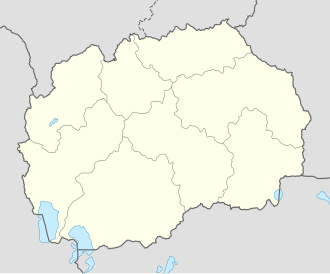Allchar deposit
| Location | |
|---|---|
| Country | Macedonia |
| Coordinates | 41°09′25″N 21°56′47″E / 41.15694°N 21.94639°E |
| Production | |
| Products | Gold, Thallium |
| History | |
| Opened | 1880 |
| Closed | 1908 |
Allchar deposit (alternative spellings Alsar deposit, Alšar deposit or Alshar deposit[1]) is a low-temperature hydrothermal gold–arsenic–antimony–thallium deposit in Kavadarci Municipality of North Macedonia. For some time, the thallium-rich part of the deposit was mined. The Crven Dol mine yielded thallium and the ore body still holds estimated amount of 500 t of thallium. The mineral lorandite from this ore deposit can be used to determine the solar neutrino flux.[2][3][1]
"Mineral collecting at Allchar is only allowed with permission from the University of Skopje. The area will be declared a protected site. In about 2010, several collectors without this permit were arrested by police."[4]
Geology
[edit]The deposit is a Carlin–type gold deposit, similar to those found in the Carlin Unconformity, Nevada. [5]
Mining
[edit]Mining of Arsenic started in the 15th century when the Ottoman Empire ruled this land.[6]
Crven Dol mine operated in the antimony-poor and arsenic- and thallium-rich layer of the orebody. The minerals making most of the orebody are realgar, orpiment, As-bearing pyrite and marcasite.[7][8][9] The deposit was mined extensively between 1880 and 1908. Antimony, arsenic and thallium were produced during that period.[10]
Minerals
[edit]Pyrite, stibnite, orpiment and realgar are the main minerals forming the ore. Lorandite – a thallium arsenic sulfosalt mineral with formula TlAsS2 – is the main thallium mineral in the deposit. Several other thallium minerals have been discovered in the mine over the years, for example, jankovićite (Tl5Sb9(As,Sb)4S22), fangite (Tl3AsS4), bernardite (TI(Sb,As)5S5).[7] vrbaite.[11]
LOREX
[edit]LORandite EXperiment (LOREX) is using lorandite from the ore deposit to determine the solar neutrino flux. This mineral contains large amounts of thallium-205 which undergoes a neutrino capturing reaction and yields lead-205 in the process. The 205Tl(νe,e−)205Pb process has a relatively low threshold energy of 52 keV and thus relatively high efficiency. With the age of the deposit of 4.5 to 4.2 million years, the solar neutrino flux can be estimated over the last 4 million years provided it is possible to determine the amount of lead-205 in a lorandite sample. This reaction can be induced not only by neutrino but other high energy cosmic particles, which all have different penetration depth in the crust. Therefore, a large volume of data is being accumulated during 2008–2010 from different depths of the deposit to produce reliable data.[2][3]
References
[edit]- ^ a b "Kozuf - untouched ecological nature". Macedonia Timeless.
- ^ a b Pavicevic, M (1988). "Lorandite from Allchar — A low energy solar neutrino dosimeter". Nuclear Instruments and Methods in Physics Research Section A: Accelerators, Spectrometers, Detectors and Associated Equipment. 271 (2): 287–296. Bibcode:1988NIMPA.271..287P. doi:10.1016/0168-9002(88)90171-4.
- ^ a b Subotic, K. M.; Pavicevic, M. K. (1998). "Status of the LOREX: Geochemical". Exotic nuclei and atomic masses (ENAM 98). pp. 912–915. doi:10.1063/1.57378. ISBN 978-1563968044.
- ^ "Allchar, Rožden, Kavadarci Municipality, North Macedonia".
- ^ Volkov, A. V.; Serafimovski, T.; Kochneva, N. T.; Tomson, I. N.; Tasev, G. (2006). "The Alshar epithermal Au-As-Sb-Tl deposit, southern Macedonia" (PDF). Geology of Ore Deposits. 48 (3): 175. Bibcode:2006GeoOD..48..175V. doi:10.1134/S1075701506030020. S2CID 128807508.
- ^ Boev, B., Šorša, A., Boev, I. (2016) Geochemical and mineralogical characteristics of the central part of the Alšar deposit (Republic of Macedonia) with particular reference to investigations by X-ray diffraction. Geologica Macedonica, 30, 115-127.
- ^ a b Cvetković, Lj.; Boronikhin, V. A.; Pavićević, M. K.; Krajnović, D.; Gržetić, I.; Libowitzky, E.; Giester, G.; Tillmanns, E. (1995). "Jankovićite, Tl5Sb9(As, Sb)4S22, a new TI-sulfosalt from Allchar, Macedonia". Mineralogy and Petrology. 53 (1–3): 125–131. Bibcode:1995MinPe..53..125C. doi:10.1007/BF01171951. S2CID 100802842.
- ^ Pavicevic, M.; Elgoresy, A. (1988). "Crven Dol Tl deposit in Allchar: Mineralogical investigation, chemical composition of Tl minerals and genetic implications". Nuclear Instruments and Methods in Physics Research Section A: Accelerators, Spectrometers, Detectors and Associated Equipment. 271 (2): 297. Bibcode:1988NIMPA.271..297P. doi:10.1016/0168-9002(88)90172-6.
- ^ Jankovic, S. (1988). "The Allchar Tl–As–Sb Deposit, Yugoslavia and its specific metallogenic features". Nuclear Instruments and Methods in Physics Research Section A: Accelerators, Spectrometers, Detectors and Associated Equipment. 271 (2): 286. Bibcode:1988NIMPA.271..286J. doi:10.1016/0168-9002(88)90170-2.
- ^ Perciva, T. J.; Radtke, AS (1994). "Sedimentary-rock-hosted disseminated gold mineralization in the Alsar district, Macedonia" (PDF). The Canadian Mineralogist. 32: 649–665.
- ^ [1] at mindat.org
